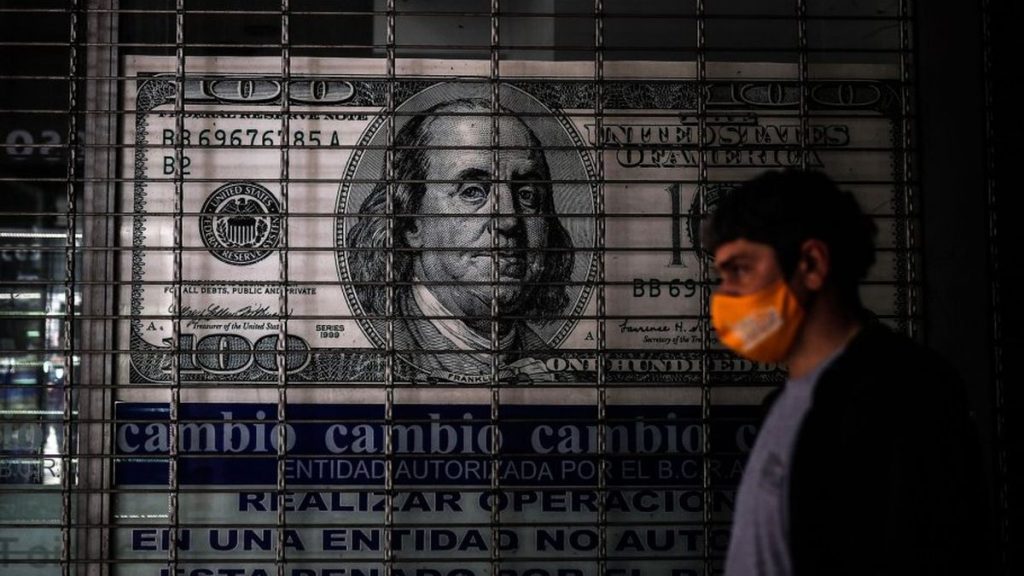employment Argentina, the dollar is a savings tool, but also A thermometer that reflects the performance of the economy and politics. When the peso drops sharply, Argentines know trouble is coming, especially big price increases. On Wednesday, the US currency was sold at 104 pesos on the official market, but its price in the unofficial circle reached 185. This exchange gap leads to all kinds of financial maneuvers affecting the reserves of the Central Bank: in what until October, it was forced to liquidate almost $200 million to meet demand and maintain the peso. Government Alberto Fernandez It seeks to maintain the peace of the exchange rate at least until the legislative elections on November 14, and to achieve this with the least possible depletion of reserves, it is committed to tightening controls on the sale of foreign currency further.
The first measures approved this week focus on importers who demand dollars at the official exchange rate to pay for goods bought abroad. The Central Bank of the Argentine Republic (BCRA) decided this Tuesday to amend the prepayment authority for some imports after discovering that since June payments have been recorded in a greater value than the goods entering. “The measure provided by the BCRA is applicable only in cases where imports are made at a value higher than what was entered and therefore affects 13% of them. The agency announced that the measure will be in effect until October 31 and seeks to balance payments with goods that have entered the country.
Last June, imports amounted to $5,600 million, and payments to $5,900 million. In July the difference was another 300 million, in August 800 and in September another 400. To over-bills imports, it is a common practice in Argentina in times of a large exchange rate gap (allowing companies to access dollars at the official exchange rate, well below the “parallel” rate), added to importers’ interest in paying. What as soon as possible to ensure the current exchange rate and not be at the mercy of a possible post-election devaluation.
The second measure is related to financial operations in the foreign exchange market. The large difference in the value of the dollar in the official market and in parallel supports the emergence of many stock exchange maneuvers through which benefits can be obtained. For this reason, the National Securities Commission imposed new restrictions on Tuesday to curb upward pressure in recent weeks, forcing the central bank to intervene daily in dollar sales.
The SEC has set a nominal limit of 50,000 per week for the sale of tradable dollar-denominated securities issued under local law with settlement in foreign currency. Those wishing to buy “MEP dollars” (as the process that results from buying bonds in pesos that are later sold in dollars is known) will have to declare that they have not managed foreign-law bonds or other dollar assets in the last 30 days and agree not to do so In the next thirty days.
“This decision was issued in coordination with BBK and the Ministry of Economy with the aim of contributing to a prudent management of the exchange market, limiting the volatility of financial variables and containing the impact of fluctuations in financial flows on the real economy. Within the framework of the current economic policy” received from the CNV.
New obstacles are added to the previous long list, among which stand out Stocks to save dollars, which is one of the most common mechanisms among Argentines to protect themselves from the numerous devaluations of the peso and high inflation (51.4% year-on-year).
In September, the central bank lost nearly $3.3 billion in reserves as a result of paying more than $1.8 billion to the International Monetary Fund and permanent intervention in the foreign exchange market. It was the worst month for the Argentine monetary authority’s coffers since September 2020 despite much more restrictive controls than the previous year. The lack of dollars in agricultural exports after the end of the harvest season always puts pressure on the value of the national currency at this time, but so does the increased availability of the peso resulting from the increased public spending of the state and its proximity to the national currency. elections.
Subscribe here To the newsletter of EL PAÍS América and receive all the informative keys to the current situation in the region

“Beeraholic. Friend of animals everywhere. Evil web scholar. Zombie maven.”

:quality(85)/cloudfront-us-east-1.images.arcpublishing.com/infobae/R5BNJX7RHGU5FSPXQJHMRLXVKE.jpg)





More Stories
Companies will continue to pay less dividends to the Treasury in 2023 than before the financial crisis
Closing value of the euro in Haiti on April 25 from EUR to HTG
This is an innovative olive oil designed to be mixed with any type of milk